新编英语教程6 Unit 6 Dull Work
新编英语教程6练习与答案
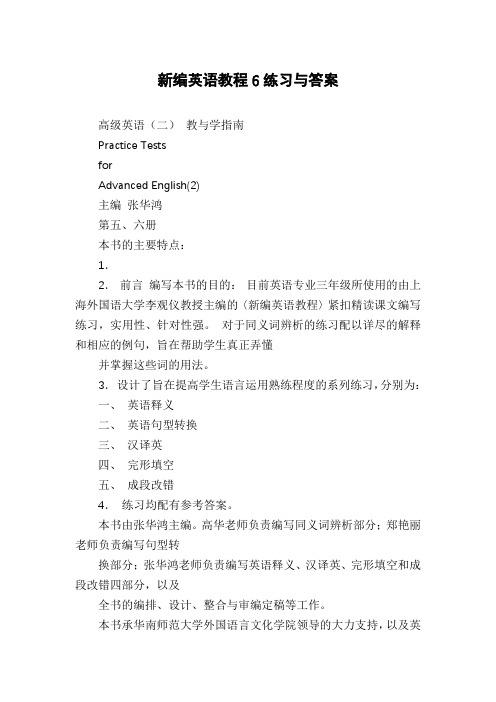
新编英语教程6练习与答案高级英语(二)教与学指南Practice TestsforAdvanced English(2)主编张华鸿第五、六册本书的主要特点:1.2.前言编写本书的目的:目前英语专业三年级所使用的由上海外国语大学李观仪教授主编的〈新编英语教程〉紧扣精读课文编写练习,实用性、针对性强。
对于同义词辨析的练习配以详尽的解释和相应的例句,旨在帮助学生真正弄懂并掌握这些词的用法。
3.设计了旨在提高学生语言运用熟练程度的系列练习,分别为:一、英语释义二、英语句型转换三、汉译英四、完形填空五、成段改错4.练习均配有参考答案。
本书由张华鸿主编。
高华老师负责编写同义词辨析部分;郑艳丽老师负责编写句型转换部分;张华鸿老师负责编写英语释义、汉译英、完形填空和成段改错四部分,以及全书的编排、设计、整合与审编定稿等工作。
本书承华南师范大学外国语言文化学院领导的大力支持,以及英语系高年级教研室全体同仁的热心帮助,编者在此表示衷心的感谢。
编者2021年1月于华南师范大学外文学院ContentsUnit One: *****S ERUPTSUnit Two: THE FINE ART OF ***** THINGS OFFUnit Three: WALLS AND *****SUnit Four: THE LADY,OR THE TIGER?Unit Five: THE LADY,OR THE TIGER?Unit Six: DULL WORKUnit Seven: BEAUTYUnit Eight: *****EUnit Nine: A RED LIGHT FOR *****WSUnit Ten: *****T-A *****ACYUnit Eleven: ON *****ING *****IPTS TOFLOPPY DISCS AND *****S TO *****NUnit Twelve: GRANT AND LEEUnit Thirteen: *****SMUnit Fourteen: THAT *****ING *****---NATUREUnit Fifteen: *****G AS **********3 16 28 40 53 65 74 84 98 114 131 147 163 175 191TEXT I Unit One*****S ERUPTSI. Paraphrase the parts underlined in the following:So the letter which you asked me to write on my uncle s death has made you eager tohear about the terrors and also the hazards I had to face 12I took a bath, dined, and then dozed 3had been earth 4Campania: but that night the shocks were so violent that everything fell as if it were notonly shaken but overturned.I don t know whether I should call this courage or 5on my part (I was onlyseventeen at the time) but I 6 and went on reading as if I hadnothing else to do.Up came a friend of my uncle s who had just come from Spain to join him. When hesaw us sitting there and me actually reading, he scolded us both ―me for my 7and my mother for allowing it.By now it was dawn [25 August in the year 79], but the light was still dim and 8The buildings round us were already 9and the open space we were in was toosmall for us not to be in real and 10danger if the house collapsed. This finally 11to leave the town. We were followed by a panic- stricken mob of peoplewanting to act on someone else s decision 12looks like 13who 14in a densecrowd.We also saw the sea sucked away and apparently forced back by the earthquake: at anyrate it receded from the shore so that 1516sand. On the landward side a fearful black cloud was 17of flame, and parted to reveal great tongues of fire, like flashes of lightning magnified insize.At this point my uncle s friend from Spain 18still more urgently: “If yourbrother, if your uncle is still alive, he will want you both to be saved; if he is dead, he wouldwant you to survive him so why put off your escape?”Soon afterwards the cloud sank down to earth and covered the sea; it had already 19Capri and hidden the promontory of Misenum from sight. Then my mother 20I looked round: a dense black cloud was coming up behind us, spreading over the earthlike a flood. “Let us leave the road while we can still see,” I said, “or we shall be knockeddown and 21in the dark by the crowd behind.”You could hear the shrieks of women, the 22some were calling their parents, others their children or their wives, trying to recognize them by their voices. People 23were some who 2425gods, but still more imagined there were no gods left, and that the universe was plungedinto eternal darkness forevermore. There were people, too, who 26inventing 27part was on fire, and though their tales were false they found others to believe them. A 28than daylight.I could boast that not a groan or cry of fear 2930dying with me and I with it.We returned to Misenum where we 31and then spent an anxious night alternating between hope and fear.II. Rewrite the followingFor each of the sentences below, write a new sentence as close in meaning as possible to1. We were followed by a panic-stricken mob of people wanting to act on someone else sdecision in preference to their own, who hurried us on our wayby pressing hard behindin a dense crowd.2. We replied that we would not think of considering our own safety as long as we wereuncertain of his.3. There were people, too, who added to the real perils by inventing fictitious dangers: somereported that part of Misenum had collapsed or another part was on fire, and though theirtales were false they found others to believe them.4. I could boast that not a groan or cry of fear escaped me in these perils, had I not derivedsome poor consolation in my mortal lot from the belief that the whole world was dyingwith me and I with it.5. Several hysterical individuals made their own and other people s calamities seemludicrous in comparison with their frightful predictions.Compared with several individuals frightful predictions, the calamities____________III. Translate the following into English1. 还未等我们坐下来喘息,夜幕已经降临,这黑暗使你觉得不是在无月色或多云的夜晚,而像是在灯火熄灭的紧闭的房间里。
新编英语教程6 dictionary work (2到10)中英对照
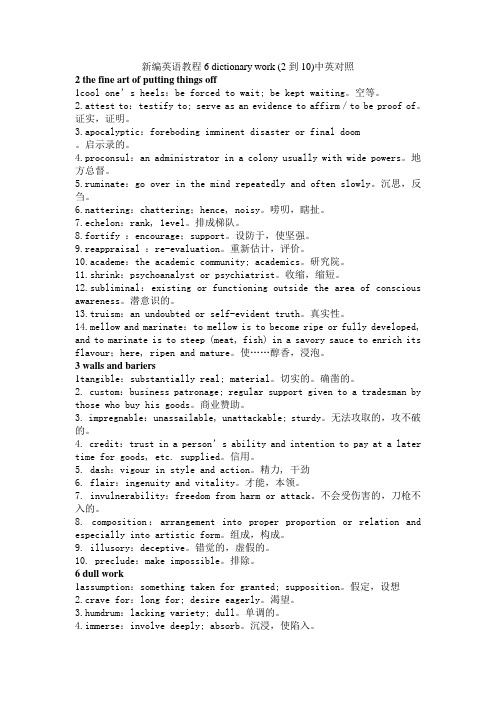
新编英语教程6 dictionary work (2到10)中英对照2 the fine art of putting things off1cool one’s heels:be forced to wait; be kept waiting。
空等。
2.attest to:testify to; serve as an evidence to affirm/to be proof of。
证实,证明。
3.apocalyptic:foreboding imminent disaster or final doom。
启示录的。
4.proconsul:an administrator in a colony usually with wide powers。
地方总督。
5.ruminate:go over in the mind repeatedly and often slowly。
沉思,反刍。
6.nattering:chattering;hence, noisy。
唠叨,瞎扯。
7.echelon:rank, 1evel。
排成梯队。
8.fortify :encourage;support。
设防于,使坚强。
9.reappraisal :re-evaluation。
重新估计,评价。
10.academe:the academic community; academics。
研究院。
11.shrink:psychoanalyst or psychiatrist。
收缩,缩短。
12.subliminal:existing or functioning outside the area of conscious awareness。
潜意识的。
13.truism:an undoubted or self-evident truth。
真实性。
14.mellow and marinate:to mellow is to become ripe or fully developed, and to marinate is to steep (meat, fish) in a savory sauce to enrich its flavour;here, ripen and mature。
高级英语 unit6 Dull work
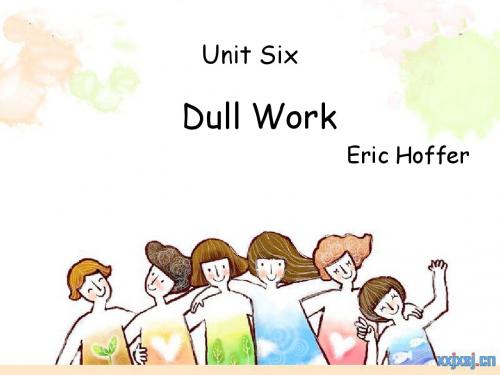
John Milton:
One of the greatest poets of the English language, best-known for his epic poem PARADISE LOST《失乐园》(1667). Milton's powerful poetry had an immense influence especially on the 18th-century verse. Besides poems, Milton published many pamphlets defending civil and religious rights.
Publiቤተ መጻሕፍቲ ባይዱations:
• The Passionate State Of Mind, and Other Aphorisms (1955) • The Ordeal of Change (1963) • The Temper of Our Time (1967) • Israel's Peculiar Position (1968) • Working and Thinking on the Waterfront (1969) • First Things, Last Things (1971) • Reflections on the Human Condition (1973) • In Our Time (1976) • Before the Sabbath (1979)
Unit Six
Dull Work
Eric Hoffer
The Author: Eric Hoffer (July 25, 1902 – May 21, 1983) was an American social writer. He was the author of ten books and was awarded the Presidential Medal of Freedom in February 1983. His first book, The True Believer《狂 热分子》, published in 1951, was widely recognized as a classic . This book, which he considered his best, established his reputation, and he remained a successful writer for most of his remaining years.
新编英语教程 6 unit 6

Words and Expressions 1.assumption:something taken for granted; supposition 2.crave for: long for; desire eagerly 3.humdrum: lacking variety; dull 4.immerse: involve deeply; absorb 5.transmute: change; transform 6.physiological pressure: irritation; annoyance; affliction 7.vexation: illness; discomfort
Body
of the essay (paras2-5) Para.2 People who achieve do not necessarily live eventful lives. Para.3 What is essential for creative work is a man’s ability to make the trivial reach an enormous way. Para.4 An eventful life does more harm than good to a creative man. Para. 5 How he himself has been benefited from his dull work experience.
8.seminal:
having possibilities of future development; highly original and influencing the development of future events 9.inordinate: excessive patible with: able to exist together 11.thrive on: enjoy and do well as a result of 12.stave off: keep off; prevent in time
新编英语教程 6 Unit 6 教案
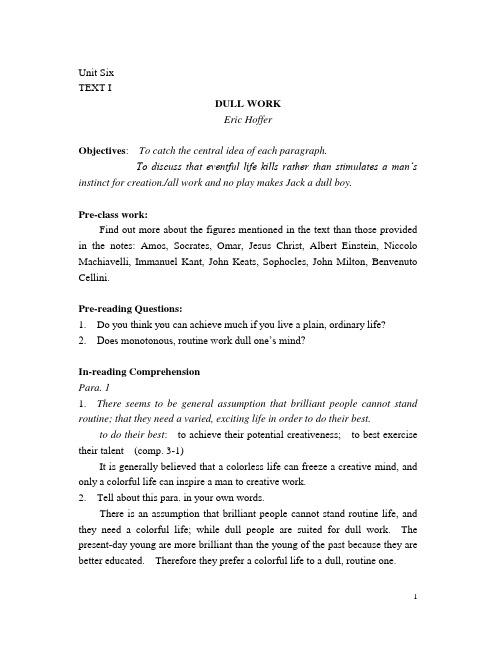
Unit SixTEXT IDULL WORKEric HofferObjectives: To catch the central idea of each paragraph.To discuss that eventful life kills rather than stimulates a man’s instinct for creation./all work and no play makes Jack a dull boy.Pre-class work:Find out more about the figures mentioned in the text than those provided in the notes: Amos, Socrates, Omar, Jesus Christ, Albert Einstein, Niccolo Machiavelli, Immanuel Kant, John Keats, Sophocles, John Milton, Benvenuto Cellini.Pre-reading Questions:1. Do you think you can achieve much if you live a plain, ordinary life?2. Does monotonous, routine work dull one’s mind?In-reading ComprehensionPara. 11. There seems to be general assumption that brilliant people cannot stand routine; that they need a varied, exciting life in order to do their best.to do their best: to achieve their potential creativeness; to best exercise their talent (comp. 3-1)It is generally believed that a colorless life can freeze a creative mind, and only a colorful life can inspire a man to creative work.2. Tell about this para. in your own words.There is an assumption that brilliant people cannot stand routine life, and they need a colorful life; while dull people are suited for dull work. The present-day young are more brilliant than the young of the past because they are better educated. Therefore they prefer a colorful life to a dull, routine one.3. What is the purpose of this para.?This is an introductory para. to put forward an assumption (successful men - colorful life; unsuccessful - dull, routine life) so as to raise a question: Is the assumption right or wrong?Para. 21. What is the ‘opposite’ that H says is ‘nearer the truth’? What is the purpose of this para.? (comp. 3-2)As it goes in the 1st sentence, the successful men do not crave for (= long for) colorful life. The contrary is also true (反过来说): people who achieve much are often those content with the routine, uneventful life they live, or, the successful men are satisfied with the routine/uneventful/colorless life they are leading.This is the central idea of this para. and H supports it by citing examples of some well-reputed men who led a colorless routine life.2. Identify those great figures mentioned in this para. and say something about them.Amos the sheepherder: a minor prophet in the Old Testament 阿摩斯,旧约中12个小先知中的第三名Socrates the stonemason: Greek philosopher well known for his sophistry Socrates of Athens, who flurished in the last half of the 5th century, was the 1st of the great trio of ancient Greeks - Socrates, Plato, and Aristotle - who laid the philosophical foundations of Western culture.He was born in or about 470 BC. His father Sophroniscus was a sculptor, mother a midwife, 3 sons, one an infant. There were 2 counts in the accusation: ‘corruption of the young’ and ‘neglect of the gods whom the city worships and the practice of religious novelties.’ An escape was planned by his freind Crito, but S refused to hear of it, on the grounds that the verdict, though contrary to the fact, was that of a legitimate court and must therefore be obeyed. The story of his last day, with his drinking of the hemlock, has been perfectly told in the Phaedo of Plato.Though a good fighting man, his outward appearance was grotesque. Stout and not tall with prominent eyes, snub nose, broad nostrils, and widemouth, he seemed a very Silenus. But as his freinds knew, he was ‘all glorious within,’ ‘the most upright man of that day.’ (Plato)Omar the tentmaker: Persian astronomer and poetJesus Christ: 上帝的独生子。
(NEW)李观仪《新编英语教程(6)》(第3版)学习指南【词汇短语+课文精解+全文翻译+练习答案】
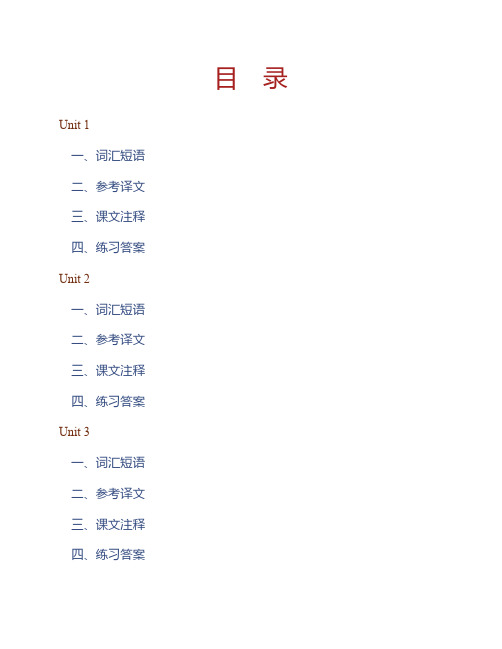
35. bitterly [5bitEli] adj. very; violently 强烈地;非常 bitterly upset 极其难 过
20. marital [5mAritl] adj. of a husband or wife; of marriage夫妇间的;婚姻 的
21. spot [spCt] v. pick out(one person or thing from many); catch sight of; recognize; discover辨出;认出;发觉;e.g. Vicenzo failed to spot the error. 维森佐没能发现这个错误。 n. 地点;斑点 on the spot 立刻,当 场;在危险中;处于负责地位 vt. 弄脏;e.g. His boots were spotted with mud. 他的靴子上沾有泥渍。
2. curious [5kjuEriEs] adj. eager to know r learn富于好奇心的,有求知欲 的,感兴趣的
3. fastidious [fAs5tidiEs] adj. selecting carefully; choosing only what is good挑剔的;苛求的,难取悦的;e.g. She is too fastidious about her food or clothing. 她爱讲究吃穿。
38. stiffly [5stifli] adj. stubbornly, obstinately 生硬地;顽固地;呆板地e.g. They greeted each other stiffly, without affection. 他们生硬地打着招呼,没 有一丝爱意。
新编英语教程第6册翻译答案
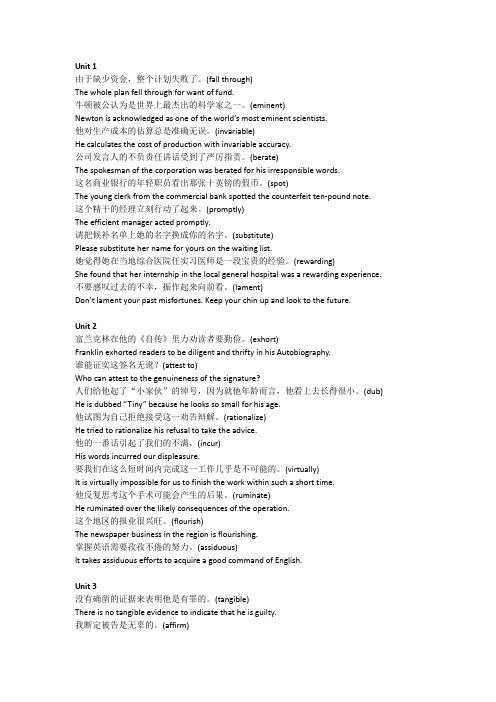
Unit 1由于缺少资金,整个计划失败了。
(fall through)The whole plan fell through for want of fund.牛顿被公认为是世界上最杰出的科学家之一。
(eminent)Newton is acknowledged as one of the world’s most eminent scientists.他对生产成本的估算总是准确无误。
(invariable)He calculates the cost of production with invariable accuracy.公司发言人的不负责任讲话受到了严厉指责。
(berate)The spokesman of the corporation was berated for his irresponsible words.这名商业银行的年轻职员看出那张十英镑的假币。
(spot)The young clerk from the commercial bank spotted the counterfeit ten-pound note.这个精干的经理立刻行动了起来。
(promptly)The efficient manager acted promptly.请把候补名单上她的名字换成你的名字。
(substitute)Please substitute her name for yours on the waiting list.她觉得她在当地综合医院任实习医师是一段宝贵的经验。
(rewarding)She found that her internship in the local general hospital was a rewarding experience. 不要感叹过去的不幸,振作起来向前看。
(lament)Don’t lament your past misfortunes. Keep your chin up and look to the future.Unit 2富兰克林在他的《自传》里力劝读者要勤俭。
新编英语教程6第1-9,11单元课本译文
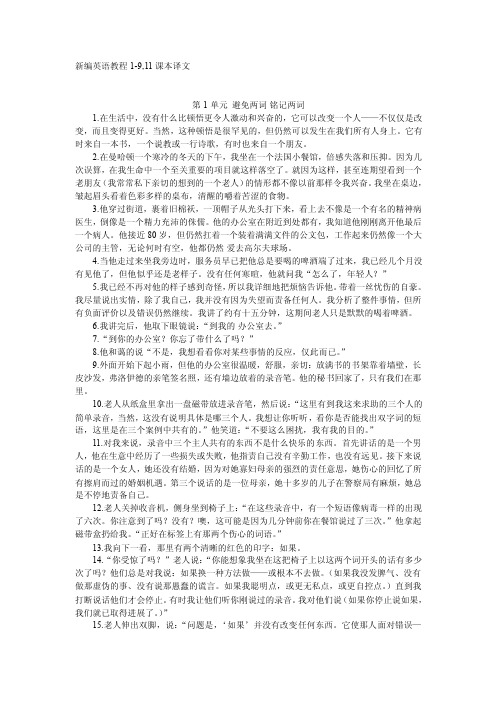
新编英语教程1-9,11课本译文第1单元避免两词铭记两词1.在生活中,没有什么比顿悟更令人激动和兴奋的,它可以改变一个人——不仅仅是改变,而且变得更好。
当然,这种顿悟是很罕见的,但仍然可以发生在我们所有人身上。
它有时来自一本书,一个说教或一行诗歌,有时也来自一个朋友。
2.在曼哈顿一个寒冷的冬天的下午,我坐在一个法国小餐馆,倍感失落和压抑。
因为几次误算,在我生命中一个至关重要的项目就这样落空了。
就因为这样,甚至连期望看到一个老朋友(我常常私下亲切的想到的一个老人)的情形都不像以前那样令我兴奋。
我坐在桌边,皱起眉头看着色彩多样的桌布,清醒的嚼着苦涩的食物。
3.他穿过街道,裹着旧棉袄,一顶帽子从光头打下来,看上去不像是一个有名的精神病医生,倒像是一个精力充沛的侏儒。
他的办公室在附近到处都有,我知道他刚刚离开他最后一个病人。
他接近80岁,但仍然扛着一个装着满满文件的公文包,工作起来仍然像一个大公司的主管,无论何时有空,他都仍然爱去高尔夫球场。
4.当他走过来坐我旁边时,服务员早已把他总是要喝的啤酒端了过来,我已经几个月没有见他了,但他似乎还是老样子。
没有任何寒暄,他就问我“怎么了,年轻人?”5.我已经不再对他的样子感到奇怪,所以我详细地把烦恼告诉他。
带着一丝忧伤的自豪。
我尽量说出实情,除了我自己,我并没有因为失望而责备任何人。
我分析了整件事情,但所有负面评价以及错误仍然继续。
我讲了约有十五分钟,这期间老人只是默默的喝着啤酒。
6.我讲完后,他取下眼镜说:“到我的办公室去。
”7.“到你的办公室?你忘了带什么了吗?”8.他和蔼的说“不是,我想看看你对某些事情的反应,仅此而已。
”9.外面开始下起小雨,但他的办公室很温暖,舒服,亲切:放满书的书架靠着墙壁,长皮沙发,弗洛伊德的亲笔签名照,还有墙边放着的录音笔。
他的秘书回家了,只有我们在那里。
10.老人从纸盒里拿出一盘磁带放进录音笔,然后说:“这里有到我这来求助的三个人的简单录音,当然,这没有说明具体是哪三个人。
新编英语教程6_答案_修订版_教师用书_李观仪

练习册:We may regard “if only” as indicating the past and “next time” the future, we all know the most important time is “now”, as past things could not be changed and future is based on “now”.I. 1. The old man was an eminent psychiatrist and the author was a client of his. (famous and respected within a particular profession)2. Refer to para. 1. To him, the session was just like “a flash of insight that leaves him a changed person—not only changed, but changed for the better.”3. The three speakers on the tape were all unhappy, and the two words they all used frequently in what they said were “if only.” What the old man wanted to point out to the author was that to keep saying “if only” would not change anything; on the contrary, it only kept the person facing the wring way—backward instead of forward. Thus it did more harm than good to the person who kept saying them. (See para. 15)4. Shift the focus; substitute “next time” for “if only”5. They point to entirely different mental directions; one is backward and negative, and the other forward and positive.6. It is instructive and inspirational.II. 1. The most inspiring and gratifying fact of life is the unexpected spark of enlightenment that makes you different and a better person than before.2. At last he walked over from the other side of the street, wrapped in his old-fashioned overcoat, his bald head covered by a shapeless felt hat. He looked like a dwarfish old man full of energy rather than a well-known psychiatrist.3. The next speaker on the tape was a woman who had remained single because she thought she was obliged to take care of her mother who was a widow. She still remembered and told others miserably about all the chances of marriage she had missed.4. Eventually, if you form a habit of sayi ng “if only”, the phrase can really turn to an obstruction, providing you with an excuse for giving up trying anything at all.5. …you are always thinking of the past, regretting and lamenting. You did not look forward to what you can do in the future at all.6. The Old Man said to me trickily, using the phrase “if only” on purpose, “If only we’d got here ten seconds earlier, we’d have caught the cab.” I laughed and understood what he meant. So I followed his advice and said, “Next time I’ll run faster”.III. 1. The whole plan fell through for want of fund.2. Newton is acknowledged as one of the world’s most eminent scientists.3. He calculates the cost of production with invariable accuracy.4. The spokesman of the corporation was berated for his irresponsible words.5. The young clerk from the commercial bankLANGUAGE WORKI. 1. C 2. C 3. D 4. B 5. C 6. A 7. D 8. A 9. D 10. B 11. A 12. B 13. C 14. D15. A 16. B 17. B 18. A 19. A 20. DIII. 1. predominantly, prevailing 2. preferential 3. tremulous 4. inadvisable, shrinkage 5. sensitive, terrorism/terror6. magnifying7. unapproachable, fictitious8. unbecoming/becoming9. unaccountable 10. disorientation 11. persuasion, entreaties 12. irremediableIV. 1. blame 2. reproached 3. blamed/reproached 4. reproached5. rebuke/reprimand6. reprimanded7. rebuke/scold/reprimand8. reprimanded9. reprimanded 10. scolded 11. reproach 12. scoldedV. 1. on 2. In 3. over 4. in 5. from 6. beneath 7. with 8. in 9. of 10. Since 11. to 12. in 13. with 14. with 15. between 16. with 17. to 18. In 19. on 20. In 21. to 22. on 23. in 24. likeVI. 1. ash 2. outbreaks 3. interval 4. eruption 5. volcanologist 6. which 7. lava 8. cone 9. flood 10. under 11. crater 12. began 13. cauliflower 14. like 15. andUnit TwoTEXT ITHE FINE ART OF PUTTING THINGS OFF未修订前的练习答案:I. Paraphrase the parts underlined in the following:“Never put off till tomorrow,” 1exhorted Lord Chesterfield in 1749, “what you can do today.”’ That the elegant earl never 2got around to marrying his so n’s mother and had a bad habit of keeping 3worthies like Dr. Johnson cooling their heels for hours in an anteroom 4attests to the fact that even the most well-intentioned men have been postponers ever. Quintus Fabius Maximus, one of the great Roman generals, was 5dubbed “Cunctator” (Delayer) for putting off battle 6until the last possible vinum break. Moses 7pleaded a speech defect to rationalize his reluctance to deliver Jehovah’s edict to Pharaoh. Hamlet, of course, raised procrastination to an art form.There are those who prepare their income taxes in February, prepay mortgages and serve precisely planned dinners at an 8ungodly 6: 30 p.m. The other half dine happily on leftovers at 9 or 10, misplace bills and 9file for an extension of the income tax deadline. They seldom pay credit-card bills until the 10apocalyptic voice of Diners threatens doom from Denver. They postpone, 11as Faustian encounters) visits to barbershop, dentist or doctor.Yet 12for all the trouble procrastination may incur, delay can often inspire and revive a creative soul.From Cunctator’ s day until this century, the art of postponement had been 13virtually a monopoly of the military (“Hurry up and wait”), diplomacy and the law. In former times, a British proconsul faced with a native uprising could comfortably 14ruminate about the situation with Singapore Sling” in hand. 15Blessedly, he had no flattering Telex to order in machine guns and fresh troops.Even 16where there is no will, there is a way. There is a difference, of course, between chronic procrastination and purposeful postponement, particularly 17in the higher echelons of business.The data explosion 18fortifies those seeking excuses for inaction —another report to be read, another authority to be consulted.His point is well 19taken. 20Bureaucratization, which flourished amid the growing burdens of government and the greater complexity of society, was designed to smother policymakers in blankets of legalism, compromise andreappraisal --- and thereby prevent hasty decisions from being made.Many languages are 21studded with phrases that refer to putting things off ---from the Spanish maiana to the Arabic bukrafil mishmish.There are all sorts of 22rationalizations: the pressure of teaching responsibilities at home, checking out the latest book, looking up another footnote.”To Georgia State Psychologist Joen Fagan, however; procrastination may be a kind of 23subliminal way of sorting the important from the trivial.It is something of 24a truism that to put off making a decision is itself a decision. The parliamentary process is essentially a system of delay and deliberation. So, 25for that matter, is the creation of a great painting, or 26an entree, or a book, or a building like Blenheim Palace, which took the Duke of Marlboro ugh’s architects and laborers 15 years to construct. In the process, the design can 27mellow and marinate.In other words, 28pace Lord Chesterfield, what you don’t necessarily have to do today, by all means put off until tomorrow.I. Paraphrase1. exhorted: urged strongly2. the elegant earl never got around to marrying his son's mother: found time for3. a habit of keeping worthies like Dr. Johnson cooling their heels for hours: men of importance like Dr. Johnson waiting4. That.…attests to the fact that: proves5. one of the great Roman generals was dubbed "Cunctator": named humorously6. for putting off battle until the last possible vinum break: until an effective defense deserving a celebration with champagne was ensureda speech defect, and that he had reasons for8. at an ungodly 6:30 p.m.: unreasonable9. to file for an extension of the income tax deadline: apply officially10.until the apocalyptic voice of Diners threatens doom from Denver: warning, suggests unavoidable destruction11.They postpone, as Faustian encounters, visits to barbershop: as if they will see devils13.the art of postponement had been virtually a monopoly of the military, diplomacy and the law: found almost only in the field of14.to ruminate about the situation with Singapore Sling in hand: go over in mind repeatedly and slowly15.Blessedly, he had no nattering Telex to order machine guns and fresh troops: fortunately, noisy16.Even there is no will, there is a way: there is no will to delay, there is a way to do so.17.in the higher echelons of business: in the case of higher levels18.The data explosion fortifies those seeking excuses for inaction: encourages, doing nothing19.His point is will taken: accepteddeveloped very quickly as a result of the expanding administrative structure and the greater complexity of society, were made to restrict policymakers, who have to be engaged in endless paperwork, mediation and reconsideration21.Many languages are studded with phrases that refer to putting things off: filled22.There are all sorts of rationalizations: reasons23.a kind of subliminal way of sorting the important from the trivial: way outside one's conscious awareness24.It is something of a truism: an undoubted truth25.for that matter: as further concerns the thing mentioned26.So…is the creation of an entree: a small carefully prepared meat dish27.the design can mellow and marinate: ripen and mature28.pace Lord Chesterfield: with all due respect toII. Rewrite the followingFor each of the sentences below, write a new sentence as close in meaning as possible to the original sentence by using the given words as the beginning.1. That the elegant earl never got around to marrying his son’s mother and had a bad habit of keeping worthies like Dr. Johnson cooling their heels for hours in an anteroom attests to the fact that even the most well-intentioned men have been postponers ever.The fact that even the most well-intentioned men have been postponers ever can be testified ___ by the elegant earl who never got around to marrying his son’s mother and had a bad habit of keeping worthies like Dr. Johnson cooling their heels for hours in an anteroom.2. Moses pleaded a speech defect to rationalize his reluctance to deliver Jehovah’s edict to Pharaoh.By saying that he had a speech defect, Moses rationalized his reluctance to deliver Jehovah’s edict to Pharaoh.3. Yet for all the trouble procrastination may incur, delay can often inspire and revive a creative soul.Although procrastination may incur, delay can, yet, often inspire and revive a creative soul.4. Bureaucratization, which flourished amid the growing burdens of government and the greater complexity of society, was designed to smother the policy-makers in blankets of legalism, compromise and reappraisal.The design of bureaucratization, which flourished amid the growing burdens of government and the greater complexity of society, was to smoother the policy-makers in blankets of legalism, compromise and reappraisal.5. There is a long and honorable history of procrastination to suggest that many ideas and decisions may well improve if postponed.Procrastination has been honored long, suggesting that many ideas and decisions may well improve if postponed.III. Translate the following into English1.事实上,拖延这种现象的漫长而骄人的历史本身就已经表明,许多构想和决定如果加以推迟可能会更为圆满。
新编英语教程第6册

I. Library Work
❖ 2. John Milton (1608 – 1674), English poet and prose writer, one of the best known and most respected figures in English literature. In 1667, he published his masterpiece, Paradise Lost.
Paragraph 1
❖ It is also assumed that..: It is also believed that …
❖ assume: take something as true
Paragraph 2
❖ crave for: long for; desire eagerly 渴望; 追求
❖ What is the “opposite” that Hoffer says is “nearer the truth”? What is the purpose of this paragraph?
Paragraph 2
❖ People who achieve much are often those content with the routine, uneventful life they live. The purpose of this paragraph is to show that the lives of many truly great men are extremely ordinary.
❖ ③ An eventful life does more harm than good to a creative mind (4)
新编英语教程6课文翻译

第1单元避免两词铭记两词在生活中,没有什么比顿悟更令人激动,更有益处了,它可以改变一个人,不仅仅是改变,而且变得更好,当然这种顿悟的时刻很罕见,但仍然会降临到我们所有人身上,它有时来自于一本书,一次不到一句诗歌,有时来自于一个朋友,在曼哈顿一个寒冷的冬季下午,我坐在一个法国小餐馆儿里,倍感失落和压抑,因为我的几次错误估算,一个对我人生至关重要的项目落空了,就连马上要见到一个老朋友(这个老人,我常私下亲切的这样想到他)的念头,都不像以前那样让我兴奋,我坐在桌边,皱起眉头看着色彩多样的桌布,反复咀嚼着自己的失误。
他来了,穿过街道,裹着旧大衣,不成形的毡帽低低的压在光头上,看上去不像是一个有名的精神病医生,倒像是一个精力充沛的小土地神,他的几个办公室就在附近,我知道他看完今天的最后一个病人,他年近80,但仍然拎着装满文件的公文包,工作起来像一个大机构的主管,只要有空,他仍然爱溜去打高尔夫球。
他敏锐的观察力早已不让我感到惊奇,于是我就详细的把烦恼告诉了他,带着一丝忧伤的自豪,我尽量的陈述实情,对自己的失意,我只能怪自己,不怪任何人,我分析了整件事情,所有的错误判断,以及不明智的行动,我讲了约有15分钟,老人默默的喝着啤酒。
老人从纸盒里拿出一盒磁带,放进录音机,然后说,磁带上有到我这里来求助的三个人的简短录音,当然我不告诉你是谁,我想让你听听,看你是否能找出,一个两字短语,是三个案例所共有的。
他笑道,别这么困惑,我有我的理由。
在我看来,磁带上三个人所共有的不是愉快的事,首先讲话的是个男人,他显然做生意遭受了一些损失,或经历了失败,他怪自己工作不够努力,没有远见,第二个说话的是个女人,他一直未婚,因为他要对自己的寡母尽孝心,他痛苦的回忆了被自己放弃的所有嫁人的机会,第三个说话的是位母亲,她十多岁的儿子被警察抓了,她不停的责备自己。
老人关掉录音机,靠在椅子上:“这些录音中有一个充满微妙毒性的短语,反复出现了六次,你听出来了吗?没有,噢,这可能是因为几分钟前在餐馆里,你自己说了三次。
新编英语教程第六册ppt课件

4
FORMAT OF TEACHING:
• Pre-reading Activities: • Brainstorming or pre-reading questions and
• previously as passive recipients;
• multiple roles: participant, interactor or negotiator, resource or assessor;
2
Course Description:
• Beyond reading comprehension: • Analysis and application of what has been learned: speaking,
3
OBJECTIVES FOR EACH LESSON
• General Idea and massage of the text; • Purpose of writing and Background information; • Writer’s opinion and tone of the passage; • Outline or structure of the text; • Linguistic strategies involved; • Style and rhetorical techniques; • CF: Purpose of the course (Xiamen University)
writing and translation; • Development of critical thinking; • Aspects of learning: • Theme, Purpose of writing, Point of view, Style, Structure,
新编英语教程6词汇(ANEWENGLISHCOURSE6:Unit1-10vocabulary)

Unit 1 Two Words to Avoid, Two to Remember1. insight: the capacity to gain an accurate and deep instinctive understanding of a situation 洞察力2. checkered tablecloth: tablecloth that has a pattern consisting of alternating squares of different colors. The British spelling of checkered is chequered.3. chew the cud (slang): think reflectively4. gnome: (in legends) a little old man who lives underground and guards the earth’s treasures 土地神; a small ugly person 侏儒5. melancholy: (adj.) sad, gloomy, depressed6. berate: scold or criticize angrily7. a perverse streak: an obstinate quality8. ruefully: regretfully9. drag: (slang) a boring thing; nuisance10. immortality: never-ending life or endless fameUnit 2 The Fine Art of Putting Things Off1. cool one’s heels: be forced to wait; be kept waiting2. attest to: testify to; serve as an evidence to affirm/ to be proof of 证实, 证明3. apocalyptic: foreboding imminent disaster or final doom 预示灾难/最后毁灭的4. proconsul: an administrator in a colony usually with wide powers地方总督5. ruminate: go over in the mind repeatedly and often slowly 反刍, 沉思6. nattering: chattering; hence, noisy7. echelon: rank, level 等级,阶层8. fortify: encourage; support 鼓励9. reappraisal: re-evaluation10. academe: the academic community; academics 学术界11. shrink: (slang) psychoanalyst or psychiatrist心理分析学者/神经科医生12. subliminal: existing or functioning outside the area of conscious awareness潜意识的13. truism: an undoubted or self-evident truth 不言而喻的道理14. mellow and marinate: to mellow is to become ripe or fully developed, and the marinate is to steep (浸, 泡) (meat, fish) in a savory sauce to enrich its flavor; here, ripen and mature 成熟及完善Unit 3 W alls and Barriers1. tangible: substantially real; material 确实的;有形的2. custom: business patronage; the fact of a person or people buying goods or services at a shop/store or business (顾客对商店的)惠顾,光顾.3. impregnable: unassailable, unattackable; sturdy无法攻取的;不能征服的4. credit: trust in a person’s ability and intention to pay at a later time for goods, etc. supplied 信用5. dash: vigor in style and action; here means enthusiasm 精力, 干劲6: flair: ingenuity and vitality才能, 本领7. invulnerability: freedom from harm or attack不会受伤害8. composition: arrangement into proper proportion or relation and especially into artistic form布局9. illusory: deceptive幻影的, 错觉的, 虚假的10. preclude: make impossible 预防; 排除1. exuberant: wild and excessive 狂野的;极度的2. withal: together with this; besides 此外;而且3. bland and genial: adj. composed and gracious 沉着亲切的4. hitch: difficulty 妨碍;困难5. assert oneself: act in such a way as to show one’s power or authori ty6. poetic justice: an outcome in which vice is punished and virtue rewarded 理想的赏罚7. emanate: come out from 发出,散发8. wend one’s way: travel over a distance, esp. slowly9. air: tune, melody10. hilarious: joyous, jubilant 欢闹的1. imperious: domineering, overbearing, arrogant 专横的2. the apple of one’s eye: one that is dear; one’s favorite person3. premises: a tract of land with the buildings thereon房屋(及其附属基地、建筑等)4. throng (v.): fill by crowding into5. moiety: half 一半6. parapet: a low wall or railing to protect the edge of a platform, etc. (阳台、桥等的)栏杆;女儿墙;胸墙7. devious: tricky, not straightforward 狡猾的;迂回的;曲折的8. reverie: daydreamUnit 6 Dull W ork1. assumption: sth. taken for granted; supposition 想当然2. crave for: long for; desire eagerly 渴望3. humdrum: lacking variety; dull 单调的4. immerse: involve deeply; absorb (使)沉浸, 使陷入5. transmute: change; transform 改变6. physiological pressures: irritation; annoyance; affliction 生理压力7. vexation: illness; discomforts 恼怒8. seminal: having possibilities of future development; highly original and influencing the development of future events 影响深远的9. inordinate: excessive 过度的;过分的10. compatible with: able to exist together 和谐的;兼容的11. thrive on: enjoy and do well as a result of 以…为乐;因…而有成12. stave off: keep off; prevent in time 延缓;暂时挡住,避开1. lamely: weakly, unsatisfactorily (听起来)信心不足的;不具说服力的2. paradoxical: seemingly self-contradictory; incongruous; puzzling3. seductive: attractive; charming4. pedagogical: teaching 教学法的5. wary: heedful; careful6. on the defensive: prepared for disapproval or attack7. demeaning overtones: implications of humiliation8. vestiges: traces that have once existed but exist no more 遗迹9. to the detriment of: to the harm of10. throes: a condition of agonizing struggle or effort; upheaval 处于极为痛苦的斗争或苦恼中;挣扎11. narcissism: excessive admiration of oneself 自我陶醉, 自恋12. obligation: duty; social requirement that compels one to follow a certain course of action13. fretful: irritable; complaining14. pass muster: be accepted as satisfactory 及格, 符合要求15. depreciation: a disparaging or a belittling act or instance 轻视,蔑视16. censure: (v. or n.) an expression of blame or disapproval 谴责17. preen: adorn or trim (oneself) carefully刻意打扮并自我欣赏18. interminable: endless1. multitudinous: (fml.) very numerous, existing in great numbers 大量的, 多种多样的2. lust: overwhelming desire or craving强烈欲望, 渴望3. orgy: excessive indulgence in any activity; wild festivity纵欲;放纵4. pitch: point, level, degree 程度;强度5. texture: quality; structure of a substance 质地;结构6. deliberate fasting: eating little or no food on purpose7. bludgeon: (written) force sb. into (doing sth.); beat 胁迫;棒击8. blow-out: (slang) a large, usu. lavish, meal 大餐;盛宴9. indulgence: great satisfaction; gratification of desires 享受;纵容10. homage: honor or respect; reverence paid 敬意11. gorge: stuff/fill oneself completely with food 狼吞虎咽12. impotence: powerlessness; ineffectualness 无力, 无效Unit 9 A Red Light for Scofflaws1. take liberties with: misinterpret; distort; violate2. blithely: heedlessly; without thought or regard3. dereliction: deliberate neglect; negligence 玩忽职守:故意忽视(职责或原则)4. exempt from: not subject to an obligation5. flurry: profusion; abundance; great quantity6. ordinance: authoritative law; command 法令;条例7. flagrant: shameless; notorious 恶名昭著的8. festering scandal: tormenting disgrace9. statutes: laws10. public nuisance: something offensive or annoying to the community, especially in violation of others' legal rights11. flouting: treating with contemptuous disregard12. dent: a depression in a surface, as from a blow; hence, damage凹痕;伤害13. brazen: shameless; impudent厚颜无耻的14. slug: (v.) (infml.) hit hard, especially with the fist 用力猛击15. skirt: avoid; keep distant from; go around the edge of 绕开;回避16. mandate: command from a superior official to an inferior one; authoritative command17. constituent: voters选民18. subvert: undermine the principle of 颠覆19. enact: institute; levy制定法律, 颁布20. puny: small and weak; insignificant弱小的;孱弱的;微不足道的21. nullify: declare legally void 使失去法律效力22. desegregation rulings: official (court) decisions on desegregation23. disquieting: upsetting24. terminally: fatally新编英语教程6(词汇Unit1-10)ants05Unit 10 Straight-A Illiteracy1. plight: condition, state, or situation; esp. an unfavorable one2. as often as not: at least half the time; frequently3. articulate: using language easily and fluently; having facility with words4. a coveted fellowship: a fellowship (i.e., the money given to postgraduate students to allow them to continue their studies at an advanced level) that everyone longs jealously to possess5. allegorically: figuratively6. gibberish: talk or writing containing many obscure, pretentious, or technical words; meaningless or unintelligible talk or writing7. providentially: fortunately; luckily8. inexorably: inescapably9. profundity: profound or deep matters10. grapple with: try to deal with11。
新编英语教程6课本译文

新编英语教程6课本译文第1单元避免两词铭记两词在生活中,没有什么比顿悟更令人激动和兴奋的,它可以改变一个人——不仅仅是改变,而且变得更好。
当然,这种顿悟是很罕见的,但仍然可以发生在我们所有人身上。
它有时来自一本书,一个说教或一行诗歌,有时也来自一个朋友。
在曼哈顿一个寒冷的冬天的下午,我坐在一个法国小餐馆,倍感失落和压抑。
因为几次误算,在我生命中一个至关重要的项目就这样落空了。
就因为这样,甚至连期望看到一个老朋友(我常常私下亲切的想到的一个老人)的情形都不像以前那样令我兴奋。
我坐在桌边,皱起眉头看着色彩多样的桌布,清醒的嚼着苦涩的食物。
他穿过街道,裹着旧棉袄,一顶帽子从光头打下来,看上去不像是一个有名的精神病医生,倒像是一个精力充沛的侏儒。
他的办公室在附近到处都有,我知道他刚刚离开他最后一个病人。
他接近80岁,但仍然扛着一个装着满满文件的公文包,工作起来仍然像一个大公司的主管,无论何时有空,他都仍然爱去高尔夫球场。
当他走过来坐我旁边时,服务员早已把他总是要喝的啤酒端了过来,我已经几个月没有见他了,但他似乎还是老样子。
没有任何寒暄,他就问我“怎么了,年轻人?”我已经不再对他的样子感到奇怪,所以我详细地把烦恼告诉他。
带着一丝忧伤的自豪。
我尽量说出实情,除了我自己,我并没有因为失望而责备任何人。
我分析了整件事情,但所有负面评价以及错误仍然继续。
我讲了约有十五分钟,这期间老人只是默默的喝着啤酒。
我讲完后,他取下眼镜说:“到我的办公室去。
”“到你的办公室?你忘了带什么了吗?”他和蔼的说“不是,我想看看你对某些事情的反应,仅此而已。
”外面开始下起小雨,但他的办公室很温暖,舒服,亲切:放满书的书架靠着墙壁,长皮沙发,弗洛伊德的亲笔签名照,还有墙边放着的录音笔。
他的秘书回家了,只有我们在那里。
老人从纸盒里拿出一盘磁带放进录音笔,然后说:“这里有到我这来求助的三个人的简单录音,当然,这没有说明具体是哪三个人。
我想让你听听,看你是否能找出双字词的短语,这里是在三个案例中共有的。
新编英语教程 6
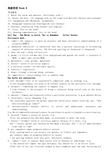
高级英语 Book 6考试题型I. Match the words and phrases: (Dictionary work )II. Choose the best: (In Language work on the items with multiple choices and synonyms) III. Paraphrase:15% (Workbook: Paraphrase)IV. Paragraph translation from English into Chinese:V. Sentence translation from Chinese into EnglishVI. Cloze: (Not in the book)VII. Reading comprehension: (Not in the book)Unit One Two Words to Avoid, Two to Remember Arthur GordonDictionary work1. sight---the capacity to gain an accurate and deep instinctive understanding of asituation洞察力2. checkered tablecloth---a tablecloth that has a pattern consisting of alternatingsquares of different colors. The British spelling of checkered is chequered3. chew the cud---think reflectively4. gnome---a little old man who lives underground and guards the earth’s treasures土地神; a small ugly person侏儒.5. melancholy---sad, gloomy, depressed6. berate---scold or criticize angrily7. a perverse streak---an obstinate quality8. ruefully---regretfully9. drag---(slang) a boring thing; nuisance10. immortality---never-ending life or endless fameKey words and expressions1.fall through---fail to be successfully completed; come to nothing. E.g.To his disappointment, his plan to do further studies in the university fell through.2. prospect---something one expects to happen. E.g.I look forward to the prospect of being a volunteer doing social work in the GreatNorthwest.3. eminent---famous and respected within a particular profession. E.g.an eminent doctor4. invariable---never changing. E.g.The invariable question the mother asked her child after school every day was: “How did everything go today?”5. perceptiveness---unusual ability to notice and understand; awareness andunderstanding.E.g. We all admired his perceptiveness; he was always so quick to respond to a new situation.6. proceed---begin a course of action. E.g.After the preparations had been made, we proceeded to draft the plan.7. berate---(formal) scold or criticize angrily because of a fault. E.g.Don’t berate anyone just because he has made a mistake. Don’t we all make mistakes from time to time?8. get somewhere—make progress/achieve successAfter working hard at our project for months, we finally got somewhere.get nowhere—make no progress/achieve no sucessI was getting nowhere with this girl, absolutely nowhere.9. lament---feel or express deep sorrow (for or because of something). E.g.1) One should not lament the past mistakes, but should try to do better later.2)The last of his own illusions seemed to have crumbled near the end. Dictating hisautobiography late in life, he commented with a crumbling sense of despair on man’s final release from earthly struggle: “…they vanish from a world where they were of no significance; where they achieved nothing; where they were a mistake and a failure and a foolishness; where they have left no sign that they had existed—a world which will lament them a day and forget them forever.”(From Mark Twain—Mirror of America by Noel Grove)10. perverse—obstinateWe just couldn’t understand her perverse decision against the majority.11. streak—an element of a specified kind in one’s character, an often unpleasantcharacteristics.Her streak of stubbornness makes her difficult to get along with.12. ruefully---regretfully. E.g. He faced his recent failure ruefully.13. promptly--quickly, at once. E.g. He always responded to the customers’requestspromptly.14. lift—(informal) a feeling of new confidence or cheerfulnessThe exam results gave me a real lift.15. grim---harsh, unpleasant, dreadful. E.g. He was depressed when he heard the grimnews that two-thirds of the workforce might be discharged.16. slide—to make sth. Go smoothly over s surfaceExercises Paraphrase1.Nothing is more exciting and rewarding than the sudden flash of light that leaves youa changed person—not only changed, but changed for the better.--The most inspiring and gratifying fact of life is the unexpected spark of enlightenment that makes you different and a better person than before.2.He came across the street, finally, muffled in his ancient overcoat, shapeless felthat pulled down over his bald head, looking more like an energetic gnome than an eminent psychiatrist.--At last he walked over from the other side of the street, wrapped in his old-fashioned overcoat, his bald head covered by a shapeless felt hat. He looked like a dwarfish old man full of energy rather than a well-known psychiatrist.3.The woman who spoke next had never married because of a sense of obligation to her widowedmother; she recalled bitterly all the marital chances she had let go by.--The next speaker on the tape was a woman who had remained single because she thought she was obliged to take care of her mother who was a widow. She still remembered and told others miserably about all the chances of marriage she had missed.4.In the end, if you let it become a habit, it can become a real roadlock, an excuse fornot trying any more.--Eventually, if you form a habit of saying “if only”, the phrase can really turn to an obstruction, providing you with an excuse for giving up trying anything at all.5.…you never got out of the past tense. Not once did you mention the future.--you are always thinking of the past, regretting and lamenting. You did not not look forward to what you can do in the future at all.6.“My, my,” said the Old Man slyly. “If only we had come down ten seconds sooner,we’d have caught that cab, wouldn’t we?”I laughed and picked up the cue. “Next time I’ll run faster.”--The Old Man said to me trickly, using the phrase “if only” on purpose. “If only we’d got here ten seconds earlier, we’d have caught the cab.”I laughed and understood what he meant. So I followed his advice and said, “Next time I’ll run faster.”I.Translation1.由于缺少资金,整个计划失败了。
新编英语教程6Unit6DullWork
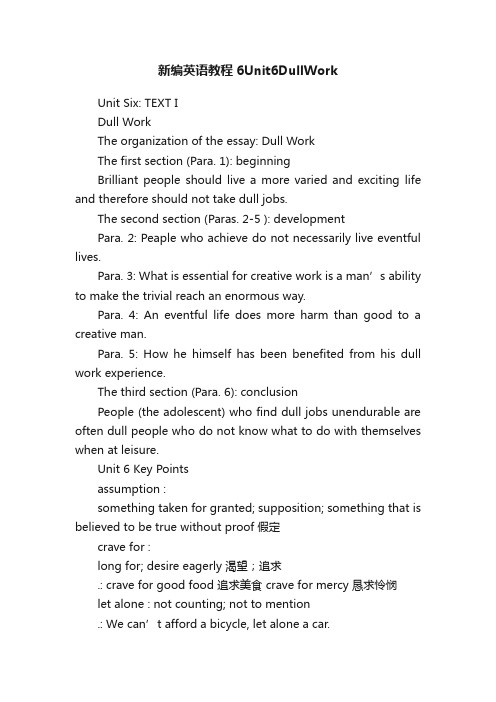
新编英语教程6Unit6DullWorkUnit Six: TEXT IDull WorkThe organization of the essay: Dull WorkThe first section (Para. 1): beginningBrilliant people should live a more varied and exciting life and therefore should not take dull jobs.The second section (Paras. 2-5 ): developmentPara. 2: Peaple who achieve do not necessarily live eventful lives.Para. 3: What is essential for creative work is a man’s ability to make the trivial reach an enormous way.Para. 4: An eventful life does more harm than good to a creative man.Para. 5: How he himself has been benefited from his dull work experience.The third section (Para. 6): conclusionPeople (the adolescent) who find dull jobs unendurable are often dull people who do not know what to do with themselves when at leisure.Unit 6 Key Pointsassumption :something taken for granted; supposition; something that is believed to be true without proof 假定crave for :long for; desire eagerly 渴望;追求.: crave for good food 追求美食 crave for mercy 恳求怜悯let alone : not counting; not to mention.: We can’t afford a bicycle, let alone a car.stonemason (= stoneman) :a person whose job is cutting stone into shape for building 石匠humdrum :monotonous; dull; lacking variety.: a humdrum job (life) 单调的工作 (生活)immerse :be completely involved in some particular activity; be absorbed in something It is often used in the phrase be immersed in.: The graduate student immersed himself in classical philosophy.men well immersed in study 潜心钻研学问的人们be immersed in debts 负债累累muleteer : a man who drives one or more mules 赶骡人transmute : vt & vichange from one form, nature, substance, or state into another; transform.: We can transmute water power into electrical power. 我们能将水力变成电力。
新编英语教程 Unit6练习册答案

Reference for Unit 6 workbook exercisesBlank FillingA.1.changed, promisinging, qualified3.determined4.spoken, leading, surprising5.frightening6.demanding7.pleased, soiledplicated9.interested, exciting, soaked10.tiring, tiredB.1.giving2.Fascinated, rising / rise3.singing, to do, making4.keeping, playing, to be, to see, climbing5.opening6.to take, shopping, doing, to do7.to have remembered, to tell, preparing, to do8.to watch, to read, reading, watching9.missing, to tell10.to be taken11.swimming, cleaning, to do12.waiting, seeing, missing, to find, to beC.1.for2.to3.of4.on5.read6.across7.about / for 8.in9.until / till10.opinion11.by12.keep13.excellent14.time15.pleasure16.from17.yourself18.in19.filled20.trains21.but22.meeting23.things24.attitude25.forD.1.speaking2.before3.by4.few5.developed6.how7.writing 8.step9.or10.of11.found12.from13.ideased15.the16.first17.represent18.cannguage20.making21.world22.to23.of24.only25.wayVI. Sentence RewritingA.1.Whenever he … bookshop, he …away from it.2.Whoever he is, he … law.3.Wherever he went, poor … life.4.Whatever you may say, I … thi ng.5.However hard he tries, he … satisfactorily6.Don’t …, whoever repeats it. / Whoever repeats it, don’t…7.However annoying his behavior is / may be, we … him.8.Whatever he … say, I … going.9.Keep calm, whatever happens. / Whatever happens, keep …10.The boy…, wherever he is. / Wherever …, the boy…B.1.To his great joy, his uncle … present.2.Much to our relief, the plane … last.3.To the surprise of the teacher, yang Ling had … heart.4.To our grief, Professor Hu died of cancer last week.5.To my satisfaction, his statement is correct.6.To the disappointment of the students, the book … bookshops.7.To their indignation, John was unfairly dismissed.。
新编英语教程第6册

Paragraph 4
❖ What does Hoffer want to illustrate by referring to Milton’s experiences? Do you fully agree with him?
❖ semen (n.): reproductive liquid produced by the sex organs of the male
Paragraph 3
❖ E.g.: the seminal existential 世纪60年代初期开创性的存 在主义小说 ❖ a seminal book 有重大影响的书
Paragraph 2
❖ The general meaning of revelation is “making known something which is true but unknown before.” 揭示,揭露;透露
❖ E.g.: The revelation that John instead of Tom was the chief designer surprised us all.
necessarily live eventful lives (2)
II. Organization of the Text
❖ ② What is essential for creative work is a man’s ability to make the trivial reach an enormous way (3)
新编英语教程6的2、3、6、7、8、9、11课课文翻译
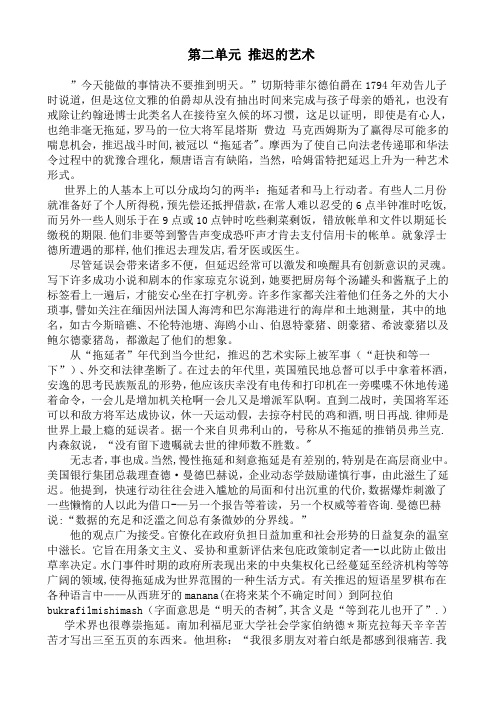
第二单元推迟的艺术”今天能做的事情决不要推到明天。
”切斯特菲尔德伯爵在1794年劝告儿子时说道,但是这位文雅的伯爵却从没有抽出时间来完成与孩子母亲的婚礼,也没有戒除让约翰逊博士此类名人在接待室久候的坏习惯,这足以证明,即使是有心人,也绝非毫无拖延,罗马的一位大将军昆塔斯费边马克西姆斯为了赢得尽可能多的喘息机会,推迟战斗时间,被冠以“拖延者"。
摩西为了使自己向法老传递耶和华法令过程中的犹豫合理化,颓唐语言有缺陷,当然,哈姆雷特把延迟上升为一种艺术形式。
世界上的人基本上可以分成均匀的两半:拖延者和马上行动者。
有些人二月份就准备好了个人所得税,预先偿还抵押借款,在常人难以忍受的6点半钟准时吃饭,而另外一些人则乐于在9点或10点钟时吃些剩菜剩饭,错放帐单和文件以期延长缴税的期限.他们非要等到警告声变成恐吓声才肯去支付信用卡的帐单。
就象浮士德所遭遇的那样,他们推迟去理发店,看牙医或医生。
尽管延误会带来诸多不便,但延迟经常可以激发和唤醒具有创新意识的灵魂。
写下许多成功小说和剧本的作家琼克尔说到,她要把厨房每个汤罐头和酱瓶子上的标签看上一遍后,才能安心坐在打字机旁。
许多作家都关注着他们任务之外的大小琐事,譬如关注在缅因州法国人海湾和巴尔海港进行的海岸和土地测量,其中的地名,如古今斯暗礁、不伦特池塘、海鸥小山、伯恩特豪猪、朗豪猪、希波豪猪以及鲍尔德豪猪岛,都激起了他们的想象。
从“拖延者”年代到当今世纪,推迟的艺术实际上被军事(“赶快和等一下”)、外交和法律垄断了。
在过去的年代里,英国殖民地总督可以手中拿着杯酒,安逸的思考民族叛乱的形势,他应该庆幸没有电传和打印机在一旁喋喋不休地传递着命令,一会儿是增加机关枪啊一会儿又是增派军队啊。
直到二战时,美国将军还可以和敌方将军达成协议,休一天运动假,去掠夺村民的鸡和酒,明日再战.律师是世界上最上瘾的延误者。
据一个来自贝弗利山的,号称从不拖延的推销员弗兰克.内森叙说,“没有留下遗嘱就去世的律师数不胜数。
- 1、下载文档前请自行甄别文档内容的完整性,平台不提供额外的编辑、内容补充、找答案等附加服务。
- 2、"仅部分预览"的文档,不可在线预览部分如存在完整性等问题,可反馈申请退款(可完整预览的文档不适用该条件!)。
- 3、如文档侵犯您的权益,请联系客服反馈,我们会尽快为您处理(人工客服工作时间:9:00-18:30)。
Unit Six: TEXT I
Dull Work
The organization of the essay: Dull Work
The first section (Para. 1): beginning
Brilliant people should live a more varied and exciting life and therefore should not take dull jobs.
The second section (Paras. 2-5 ): development
Para. 2: Peaple who achieve do not necessarily live eventful lives.
Para. 3: What is essential for creative work is a man’s ability to make the trivial reach an enormous way.
Para. 4: An eventful life does more harm than good to a creative man.
Para. 5: How he himself has been benefited from his dull work experience.
The third section (Para. 6): conclusion
People (the adolescent) who find dull jobs unendurable are often dull people who do not know what to do with themselves when at leisure.
Unit 6 Key Points
assumption (l.1):
something taken for granted; supposition; something that is believed to be true without proof 假定
crave for (l.6):
long for; desire eagerly 渴望;追求
E.g.: crave for good food 追求美食crave for mercy 恳求怜悯
let alone (l.6): not counting; not to mention
E.g.: We can’t afford a bicycle, let alone a car.
stonemason (= stoneman) (l.8):
a person whose jo
b is cutting stone into shape for building 石匠
humdrum (l.9):
monotonous; dull; lacking variety
E.g.: a humdrum job (life) 单调的工作(生活)
immerse (l.11):
be completely involved in some particular activity; be absorbed in something
It is often used in the phrase be immersed in
E.g.: The graduate student immersed himself in classical philosophy.
men well immersed in study 潜心钻研学问的人们
be immersed in debts 负债累累
muleteer (l.12): a man who drives one or more mules 赶骡人
transmute (l.16): vt & vi
change from one form, nature, substance, or state into another; transform
E.g.: We can transmute water power into electrical power. 我们能将水力变成电力。
Energy transmutes into matter. 能量变成物质。
grievance (l.18): a report of or cause for complaint, especially of unjust treatment 委屈,不平的事;冤情
E.g.: I think you have several saved-up grievances. 我看你心里积了好些牢骚。
a joint labor-management committee to act on grievances 负责处理申诉的劳资共同委员会physiological pressures (l.18): illnesses; discomforts
vexation (l.19): irritation; annoyance; affliction
seminal (l.20) (Note 11): (formal) influencing future development in a new way 有潜在发展可能性的;开创性的;有重大影响的;重要的
semen (n.): reproductive liquid produced by the sex organs of the male
E.g.: a seminal book 有重大影响的书
This experience was to have a seminal influence on his own political development.
这段经历后来对他政治上的发展具有重大影响。
equidistant (l.20) (Note 11): at equal distances; equally distant from or close to 等距离的
E.g.: Points on a circle are equidistant from its center. 圆周上各点与圆心等距。
inordinate (l.21):
(formal) beyond reasonable limits; excessive 无节制的,过度的,放纵的;极度的;非常的 E.g.: an inordinate cigarette-smoker 抽烟无度的人chain smoker
mediocre (l.29) (Note 15):
of not very good or bad quality or ability, usually not good enough 平庸的
faculty (l.31): a natural power of the mind or body 官能;能力;技能;天赋
E.g.: the faculty of hearing / speech / memory 听觉/ 语言能力/记忆能力
critical faculties 重要能力
compatible with (l.33): able to exist together 兼容的;和睦的
E.g.: compatible family relationships. 和谐的家庭关系
savor (l.33): (literal meaning) taste (good food or drink) and enjoy it to the full; enjoy slowly and purposefully 品尝;细嗅
E.g.: She savored every mouthful of the honeydew melon (甜瓜) as this was the first time she had ever tasted this fruit.
He savored the friendly atmosphere at the party.
thrive on (l.40):
enjoy and do well as a result of; grow vigorously; flourish 茁壮成长
E.g.: Babies thrive on their mother's milk. 婴儿靠吃母乳长得很健壮。
He that will thrive, must rise at five. [谚]五更起床, 百事兴旺。
stave off (l.42): keep away; fend off 避开;防止;延迟;打退,击退;赶走
E.g.: stave off the evil day 避开不吉之日
stave off wild animals 把野兽赶走。
